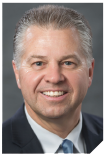The Importance of Laughter in Our Lives and Organizations
By David Unmacht

When your public service career knocks on the door of four decades, across sectors and levels of local government, you naturally accumulate a number of wins and losses. Tenure, in and of itself, does not necessarily imply success or achievement in life. However, length in public service does offer an invitation to recall and reflect on countless life and work experiences. It is healthy to think about what matters and what, truly in the end, does not.
With the backdrop of the challenges we’ve faced in local government and society as a whole over the past two years, I have been driven to even more reflection. I’ve been driven to learn more about history and how it compares to and shapes the present. I’ve been driven to share with more urgency what I know and what I’ve learned, with the goal of helping and mentoring current and future leaders.
 I thoroughly enjoy reading and studying the past and applying this knowledge to understand today’s events. It puts our present trials and tribulations into perspective. This past spring, I read Pulitzer Prize-winning author and historian John Meacham’s biography of President George H.W. Bush, Destiny and Power: The American Odyssey of George Herbert Walker Bush. By today’s standards, the 41st president was an honorable man and, although wealthy, he was humble. Admittedly, he was not the best politician, but he served his country in war and in public office like few others in our nation’s 246 years.
I thoroughly enjoy reading and studying the past and applying this knowledge to understand today’s events. It puts our present trials and tribulations into perspective. This past spring, I read Pulitzer Prize-winning author and historian John Meacham’s biography of President George H.W. Bush, Destiny and Power: The American Odyssey of George Herbert Walker Bush. By today’s standards, the 41st president was an honorable man and, although wealthy, he was humble. Admittedly, he was not the best politician, but he served his country in war and in public office like few others in our nation’s 246 years.
After reading the book, I watched the eulogies from his 2018 funeral at Washington National Cathedral. Bush’s good friend, former Wyoming Sen. Alan Simpson, gave a remarkable 11-minute tribute recounting his memories of the man and the times he shaped and influenced.
Simpson said Bush loved a good joke and loved to laugh. “Humor is the universal solvent against the abrasive elements of life,” he said. “That is what humor is.” I am not alone in contemplating that we are in a period where “the abrasive elements of life” seem to be winning, and humor is relegated to another era. That’s why this topic is important to me.
I am not much of a joke teller, neither am I particularly funny. Yet I understand the importance of humor. It can be an effective way to build relationships and connections. I can “give it out with the best,” knowing it will come back at me. I enjoy taking the brunt of a good joke; my malaprops and gaffes offer softballs to anyone who wants to take a swing.
I can laugh at myself with self-deprecating ease. I deserve (almost all) of what I get. It makes me human, and it makes me a more personable and effective leader. I understand my position and title have certain conditions; it goes with the territory. I take my job seriously, but I don’t take myself too seriously.
Laughing can be a tool for healing. When I was going through a difficult period in my career trying to decide whether to accept a specific job offer, I was in the dumps big-time. I try not to indulge in self-pity, but I was close. I needed something to change course — and it came unknowingly.
I attended and spoke at a retirement party for Ralph Teschner, longtime finance director for the City of Prior Lake. The stories, the memories, made me laugh for two hours; it was like months of tension vanished in a moment. My attitude and perspective changed. The adage, “Laughter is the best medicine,” was proven right!
What’s my point? We need more universal solvent in our public life, in our institutions, and in our relationships. Take a measure of the humor in your life and organization. How and when do you laugh? How does it help you? Why is it important?
Simpson was particularly pointed in explaining Bush’s penchant for a good joke. He said that even though Bush “never ever could remember a punchline — I mean never — he never lost his sense of humor.”
This is familiar to me, as I can’t remember a punchline and I never want to lose my sense of humor either. Maybe that’s why this eulogy struck home to me. And above everything, these words have even more meaning for us as leaders today.
David Unmacht is executive director of the League of Minnesota Cities. Contact: dunmacht@lmc.org or (651) 281-1205.

